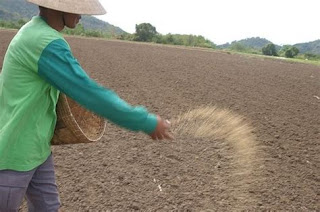Holy Sonnets: Batter my heart, three-person'd God
Batter my heart, three-person'd God, for you
As yet but knock, breathe, shine, and seek to mend;
That I may rise and stand, o'erthrow me, and bend
Your force to break, blow, burn, and make me new.
I, like an usurp'd town to another due,
Labor to admit you, but oh, to no end;
Reason, your viceroy in me, me should defend,
But is captiv'd, and proves weak or untrue.
Yet dearly I love you, and would be lov'd fain,
But am betroth'd unto your enemy;
Divorce me, untie or break that knot again,
Take me to you, imprison me, for I,
Except you enthrall me, never shall be free,
Nor ever chaste, except you ravish me.
Jacob Wrestles With God
22 That night Jacob got up and took his two wives, his two female servants and his eleven sons and crossed the ford of the Jabbok. 23 After he had sent them across the stream, he sent over all his possessions. 24 So Jacob was left alone, and a man wrestled with him till daybreak. 25 When the man saw that he could not overpower him, he touched the socket of Jacob’s hip so that his hip was wrenched as he wrestled with the man. 26 Then the man said, “Let me go, for it is daybreak.”
But Jacob replied, “I will not let you go unless you bless me.”
27 The man asked him, “What is your name?”
“Jacob,” he answered.
28 Then the man said, “Your name will no longer be Jacob, but Israel, because you have struggled with God and with humans and have overcome.”
Last Sunday our vicar, preached on this subject at our Sunday Service at Trinity He used it as an allegory for the way that we enter into the Kingdom of Christ. It is all by Christ's grace for us. God invites into His kingdom but there may be many struggles with Him along the way. It reminds me of a poem by Frances Thompson, rather long but the first verse gives a flavour:
The Hound of Heaven
I fled Him down the nights and down the days
I fled Him down the arches of the years
I fled Him down the labyrinthine ways
Of my own mind, and in the midst of tears
I hid from him, and under running laughter.
Up vistaed hopes I sped and shot precipitated
Adown titanic glooms of chasmed fears
From those strong feet that followed, followed after
But with unhurrying chase and unperturbed pace,
Deliberate speed, majestic instancy,
They beat, and a Voice beat,
More instant than the feet:
All things betray thee who betrayest me.
The full poem can be found: Here
The only reason that anyone becomes a Christian is that Jesus sets His love upon them, what theologians call irresistible Grace, He then sets His bloodhound, figuratively speaking, the Holy Spirit, onto His beloved until He is captivated by Jesus. Does this mean that people do not have any part in bringing a new disciple to faith? "No way", Jesus uses His friends on earth, each one motivated in their turn by the Holy Spirit to work on an individual.
Going back to the Golf club analogy in the last blog every time that an individual reacts with a Christian there is a small propulsion towards the Kingdom of God for that individual. It may be a prayer, a kind word, a befriending, a book lent, or an introduction to a church service or, better still an Alpha course. Each one of us is on their own Spiritual journey, which we can share with many people along the way.
In my own Spiritual journey, I had many such helps, I was brought up in a Christian household supported by the prayers of my parents and a very Godly great aunt. I was sent to Sunday school were I heard the bible read, and many of the stories I could commit to memory. However as I studied science at secondary school, I thought that the faith of my parents was simplistic and out of date, yes this was the swinging sixties. I became convinced that the scientific principle was what would govern my life and I plunged into my medical studies at Barts hospital.
However I was far from happy in my new environment and soon became very depressed and felt the need for something else in my life. I was very attracted to a group of students who always had coffee together and seemed to always be full of laughter and merriment, I was quickly attracted to them.
They were always very welcoming, and I noticed that they often talked about having a personal relationship with God, something I had not really come across before. I really wanted whatever this group had got, and one day one of them took me aside and explained that all I had to do was ask Jesus into my life, say sorry for my previous rejection and rebellion and I would be what he described as, "be born again". I said a simple prayer and yes there was a change; my depression and sense of frustration went, and I had an insatiable desire to read the new testament again. I had found a copy in my flat in a new translation. Suddenly the scriptures which I had learnt as a boy burst into light. Jesus did indeed have hold of my life. He has never left me even though at times I have drifted away from Him. He is always pursuing and rescuing me just as Jesus told in the story of a Good Shepherd who left 99 sheep in the wilderness to go after and retrieve the one lost sheep.




